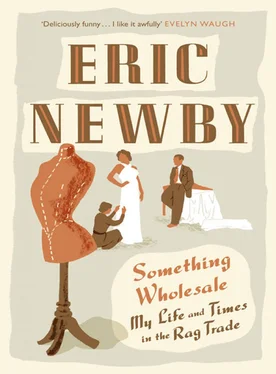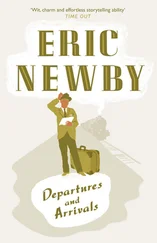There is a whole gallery of memorable characters in these albums. Captain and Mrs Buckle – Mrs Buckle smoked a hundred cigarettes a day. ‘Gaspers’ she used to call them, and her voice was reduced to a hollow croak. Ivor – a young man who had an open Vauxhall with a boat-shaped body and used to drive to Devonshire in silk pyjamas after parties in London. He inherited a fortune when he was twenty-one, got through it in a year and became a bus driver. He used to wave to my mother when he drove the number nines over Hammersmith Bridge. And there is another buyer called Phyll – who lived in sin with someone called Uncle Fred, who wasn’t an uncle. At Christmas time Auntie Phyll’s flat resembled a robber’s cave with presents from manufacturers piled high in it. Those were days when a fashion buyer was expected to feather her nest (nobody else was going to do it for her) and many a buyer was able to retire to a riverside cottage on the proceeds of the toll she exacted from the manufacturers on every dress that went into her department. On one occasion a disgruntled manufacturer informed the management that Auntie Phyll was taking a percentage in this way but was nonplussed when he was told by the Managing Director that they didn’t care what bribes she received providing that the clothes she bought were as well chosen and as cheap as those of their competitors.
And there is a whole supporting cast of rural characters from the village where we had taken a cottage for the summer. Photographs of the innkeeper, who was having a violent affair with the barmaid under the nose of his wife; photographs of his wife and the barmaid, who looks very innocent in a velvet dress, and pictures of village children with whom I used to float paper boats down an open sewer; and the policeman’s son who taught me to say bloody. Once for a bet I drank the water from the sewer. The results were not what normal medical experience would lead one to expect. Instead of contracting dysentery I had a complete stoppage of the bowels that lasted for more than a week.
And there is the last photograph I have of my father. He is sitting with my mother in an umpire’s launch on the river at Hammersmith. It is the summer of the year he died. He has shrunk with the years, but with his white club cap he looks for all the world like a mischievous schoolboy.
CHAPTER ONE A Short History of the Second World War
One morning in August 1940 ‘A’ Company, Infantry Wing, was on parade outside the Old Buildings at the Royal Military College, Camberley. Company Sergeant-Major Clegg, a foxy looking Grenadier, was addressing us ‘… THERE WILL BE NO WEEKEND LEAF,’ he screamed with satisfaction. (There never had been.) ‘That means no women for Mr Pont, Mr Pont (there were two Mr Ponts – cousins). Take that smile off your face Mr Newby or you’ll be inside. Wiring and Demolition Practice at 1100 hours is cancelled for Number One Platoon. Instead there will be Bridging Practice. Bridging Equipment will be drawn at 1030 hours. CUMPNEE … CUMPNEEEE … SHAAH!’
‘Heaven,’ said the Ponts as we doubled smartly to our rooms to change for P.T. ‘There’s nothing more ghastly than all that wire.’
I, too, was glad that there was to be no Wiring and Demolition. Both took place in a damp, dark wood. Wiring was hell at any rate and Demolition for some mysterious reason was conducted by a civilian. It always seemed to me the last thing a civilian should have a hand in and I was not surprised when, later in the war, he disappeared in a puff of smoke, hoist by one of his own petards.
In June 1940, after six months of happy oblivion as a private soldier, I had been sent to Sandhurst to be converted into an officer.
Pressure of events had forced the Royal Military College to convert itself into an O.C.T.U., an Officer Cadet Training Unit, and the permanent staff still referred meaningfully in the presence of the new intakes to a golden age ‘when the gennulmen cadets were ’ere’.
‘’Ere’ we learned to drill in an impressive fashion and our ability to command was strengthened by the Adjutant, magnificent in breeches and riding boots from Maxwell, who had us stationed in pairs on the closely mown lawns that sloped gently to the lake. A quarter of a mile apart, he made us screech at one another, marching and countermarching imaginary battalions by the left, by the right and by the centre until our voices broke under the strain and whirred away into nothingness.
Less well we carried out a drill with enormous military bicycles as complex as the evolutions performed by Lippizanas at the Spanish Riding School. On these treadmills which each weighed between sixty and seventy pounds, we used to wobble off into the surrounding pine plantations, which we shared uneasily with working parties of lunatics from the asylum at Broadmoor, for T.E.W.T.s – Tactical Exercises Without Troops.
Whether moving backwards or forwards the T.E.W.T. world was a strange, isolated one in which the lunatics who used to wave to us as we laid down imaginary fields of fire against an imaginary enemy might have been equally at home. In it aircraft were rarely mentioned, tanks never. We were members of the Infantry Wing. There was an Armoured Wing for those who were interested in such things as tanks and armoured cars and the authorities had no intention of allowing the two departments to mingle. Gradually we succumbed to the pervasive unreality.
‘I want to bring home to you the meaning of this war,’ said a visiting General. ‘In four months those of you who are not R.T.U.’d – Returned to your Units – will be platoon commanders. In six months’ time most of you will be dead.’
And we believed him. Our numbers were already depleted by a mysterious outbreak of bed-wetting – an R.T.U.-able offence. In a military trance we imagined ourselves waving ashplants, charging machine-gun nests at the head of our men. The Carrara marble pillars, which supported the roof of the chapel in which we carried out our militant devotions, were scarcely sufficient to contain the names of all those other ‘gennulmen’ who, in the earlier war, had died in the mud at Passchendaele and among the wire on the forward slopes of the Hohenzollern Redoubt. They had sat where we were sitting and their names were set out in neat columns on the pillars like debit entries in some terrible ledger.
This dream of Death or Glory affected our leisure. Most of us had passed our formative years in the outer suburbs. Now, to make ourselves more acceptable to our employers we took up beagling (the College had the Eton Beagles for the duration); ordered shirts we couldn’t afford from expensive shirt-makers in Jermyn Street and drank Black Velvet in the Hotel. The snugger pubs were out of bounds for fear we might meet a barmaid who ‘did it’. No one but a maniac would have wanted to do it with the one at the Hotel.
The bridging equipment was housed in a low, sinister-looking shed near the lake on which we were to practise. This was not the ornamental lake in front of the Old Buildings on which, in peace time, playful cadets used to float chamber pots containing lighted candles – a practice now forbidden by the blackout regulations. It was an inferior lake, little more than a pond; from it rose a dank smell of rotting vegetation.
Inside the shed there were a number of small decked-in pontoons and strips of heavy teak grating which were intended to form the footway. Blocks and tackle hung in great swathes from the roof; presumably they were to hold the bridge steady in a swiftly flowing stream. Everything seemed unnecessarily heavy, as though it was part of the gear of a wooden ship-of-the-line.
There was every sign that the bridge had not been used for years – if at all. The custodian, a grumpy old pensioner rooted out of his cottage to open the door, confirmed this.
Читать дальше












